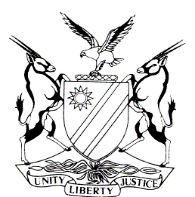PRACTICE DIRECTIVE 61
REPUBLIC OF NAMIBIA

IN THE HIGH COURT OF NAMIBIA, MAIN DIVISION, WINDHOEK
REVIEW JUDGMENT
Case Title: The State v Johannes Kativa Kativa | Case No: CR 27/2021 |
High Court MD Review No:
1401/2020 | Division of Court: Main Division |
Heard before:
Judge Claasen et Judge Usiku | Delivered on:
20 April 2021 |
Neutral citation: S v Kativa (CR 27/2020) [2021] NAHCMD 173 (20 April 2021) |
The order:
The conviction and sentence are set aside. The matter is referred back to the Office of the Prosecutor General to institute a charge afresh if so inclined. In terms of section 312 of the CPA the accused should be brought before the trial court and the Magistrate is directed to conduct proceedings along the guidelines set out in this judgement and to bring the matter to its natural conclusion. In the event of a conviction, the magistrate in considering an appropriate sentence, should have regard to the time the accused has spent in custody.
|
Reasons for order: |
Claasen J ( concurring Usiku J)
The accused was charged for being in possession of illicit cigarettes, in contravention of s 17(1) of Act 1 of 2010, to wit 163 packets of ‘Yes Cigarettes’ to the value of N$ 1 630. After a few relatively short remands the accused pleaded guilty and was convicted in terms of section 112(1)(b) of the CPA. He was sentenced to pay a fine of N$ 20 000 or 3 years imprisonment. He has not paid the fine and thus started serving his sentence on 15 June 2020, being the date when the matter was finalized.
When the matter appeared on automatic review a query was raised. That was because the record of the first appearance at court did not bear any indication that the accused was formally informed of the charge nor was there any explanation of the right to legal representation.
The Magistrate in her reply explained that the first appearance was done ‘in absentia’ of the accused, nor was such explanation done at any of the subsequent appearances. I struggle to comprehend what it means to have a first appearance at court ‘in absentia’. The intention of the Constitutional requirement that an accused needs to be brought before court within 48 hours of arrest is to promptly and formally inform him of the reason for the arrest, to avoid arbitrary arrests or detentions. In addition, a fundamental component of such a first appearance at court, is that the accused be informed of his right to legal representation so that preparation of his defence and ancillary procedures can commence. To speculate as to why the gold standard was not followed in this case, will not remedy the situation, save to say that the failure to do so amounts to a grave irregularity.
This was not the only problematic aspect that was noticed. The charge label reads that the accused was charged for ‘possession’ of illicit cigarettes in contravention of s 17(1) of the Tobacco Products Control Act 1 of 2010. In reading the relevant section, it criminalises the act of ‘selling’ or ‘import for sale,’ a tobacco product that does not bear the statement of ‘Sales only allowed in Namibia’ or any other effective marking indicating the origin thereof and the final destination for sale. (My emphasis) It is thus confusing if the label speaks of mere possession whereas the crux of the charge revolves around the act of trading in or importation of illicit cigarettes. Although ‘as a general rule, an accused should not be allowed to escape conviction only as a result of the prosecution's attachment of an incorrect "label" to a statutory offence…’ , an incorrect charge label may deceive an accused into thinking he/she is pleading guilty to a lesser offence. The charge forms the basis of the criminal proceedings and serves to inform not only the accused but also the court of the case the State intends to prove. There must be congruence between the charge label and the charge particulars.
The s 112(1)(b) questioning also had problems. At the outset the accused was boldly told what he did in the following words: Q: Is it so that you sold or trade in illicit cigarettes on the 06/04/2020 at or near by Tuhingireni location in the district of Rundu sir?’ This approach does nothing else but trap an undefended accused into a corner, which is not in accordance with the safeguards of a conviction in terms of s 112(1)(b) of the CPA. Questioning of an unrepresented accused must be done with care and leading questions are discouraged at the outset. In no question was posed about the brand particulars, i.e. to ascertain that the product did not have the wording, ‘Sales only in Namibia’. Thus the court could not have been satisfied that indeed these were illegal cigarettes.
Cumulatively, as a result of the above misdirections I find myself unable to certify that the proceedings were in accordance with justice. Therefore the conviction and sentence are set aside.
In the result the following order is made: The conviction and sentence are set aside. The matter is referred back to the Office of the Prosecutor General to institute a charge afresh if so inclined. In terms of section 312 of the CPA the accused should be brought before the trial court and the Magistrate is directed to conduct proceedings along the guidelines set out in this judgement and to bring the matter to its natural conclusion. In the event of a conviction, the magistrate in considering an appropriate sentence, should have regard to the time the accused has spent in custody.
|
|
|
C CLAASEN JUDGE | D N USIKU JUDGE |
